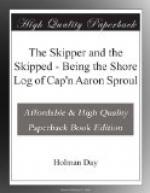The Cap’n was sitting in front of the toll-house. The tall horse galloped down the hill, but the Colonel stood up, and, with elbows akimbo and hands under his chin, yanked the animal to a standstill, his splay feet skating through the highway dust. The Colonel leaped over the wheel and reversed his heavy whip-butt. The Cap’n stood up, gripping a stout cudgel that he had been whittling at for many hours.
While the new arrival was choking with an awful word that he was trying his best to work out of his throat, the Cap’n pulled his little note-book out of his pocket and slowly drawled:
“I reckoned as how ye might find time to stop some day, and I’ve got your account all figgered. You owe thirteen tolls at ten cents each, one thutty, and thirteen times three dollars fine—the whole amountin’ to jest forty dollars and thutty cents. Then there’s a gate to—”
“I’m goin’ to kill you right in your tracks where you stand!” bellowed the Colonel.
The Cap’n didn’t wait for the attack. He leaped down off his porch, and advanced with the fierce intrepidity of a sea tyrant.
“You’ll pay that toll bill,” he gritted, “if I have to pick it out of your pockets whilst the coroner is settin’ on your remains.”
The bully of the countryside quailed.
“You’ve stole my sister!” he screamed. “This ain’t about toll I’m talkin’. You’ve been and robbed me of my sister!”
“Do you want to hear a word on that?” demanded the Cap’n, grimly. He came close up, whirling the cudgel. “You’re an old, cheap, ploughed-land blowhard, that’s what you are! You’ve cuffed ’round hired men and abused weak wimmen-folks. I knowed you was a coward when I got that line on ye. You don’t dast to stand up to a man like me. I’ll split your head for a cent.” He kept advancing step by step, his mien absolutely demoniac. “I’ve married your sister because she wanted me. Now I’m goin’ to take care of her. I’ve got thutty thousand dollars of my own, and she’s giv’ me power of attorney over hers. I’ll take every cent of what belongs to her out of your business, and I know enough of the way that your business is tied up to know that I can crowd you right to the wall. Now do ye want to fight?”
The tyrant’s face grew sickly white, for he realized all that threat meant.
“But there ain’t no need of a fight in the fam’ly—and I want you to understand that I’m a pretty dum big part of the fam’ly after this. Be ye ready to listen to reason?”
“You’re a robber!” gasped the Colonel, trying again to muster his anger.
“I’ve got a proposition to make so that there won’t be no pull-haulin’ and lawyers to pay, and all that.”
“What is it?”
“Pardnership between you and me—equal pardners. I’ve been lookin’ for jest this chance to go into business.”
The Colonel leaped up, and began to stamp round his wagon.
“No, sir,” he howled at each stamp. “I’ll go to the poor-farm first.”




